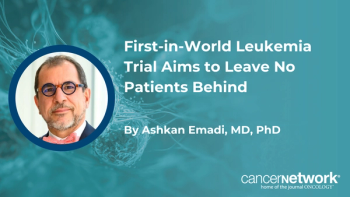
Oncology NEWS International
- Oncology NEWS International Vol 5 No 8
- Volume 5
- Issue 8
Nurse Explains Start-up of Genetic Cancer Risk Assessment Program
SAN DIEGO--With more than 200 known hereditary cancers syndromes, there is a clear opportunity for medical centers in this field, said LeeAnne Vandegriff, RN, cancer risk assessment coordinator at Harris Methodist Hospital, Fort Worth.
SAN DIEGO--With more than 200 known hereditary cancers syndromes,there is a clear opportunity for medical centers in this field,said LeeAnne Vandegriff, RN, cancer risk assessment coordinatorat Harris Methodist Hospital, Fort Worth.
"It's important to point out that in our center and in othercenters across the country, it's not a money-making enterprise.It's provided as a service to patients," Ms. Vandegriff saidat a symposium sponsored by the Society for Ambulatory Care Professionalsand Health Technology Assessment of the American Hospital Association.
The purpose of the Texas center is to identify high-risk familymembers, educate them about their risk based on their heredity,and provide screening recommendations.
Studies suggest that families with a history of cancer usuallyoverestimate their chances of getting the disease, Ms. Vandegriffnoted. "We feel that the assessment program helps give thoseindividuals a more realistic view of their risk," she said.
Institutions thinking about starting a genetic risk assessmentprogram need to follow a series of steps: Locate funding; finda coordinator; develop a marketing program; and, if the serviceis not being developed in-house, choose a reputable organizationto provide the service.
For its provider, Harris Methodist selected the Hereditary CancerConsulting Service, which is associated with OncorMed, a companythat provides genetic testing and software for hereditary cancerconsulting services, Ms. Vandegriff explained.
Initial Funding
When Harris Methodist launched its cancer assessment service,it convinced an outside charity to fund the endeavor initially.The first 2 years cost about $100,000, Ms. Van-degriff said, butafter that, the medical center was on its own financially.
"The cancer program paid the tab last year. In 1996 the hospital'sbreast center advisory is picking up about 60% of the cost because60% of the participants were women found to be in high-risk breastcancer families," she said, adding that "the hospitaldoesn't charge participants for the genetic assessment."
With frugality a necessity, marketing is low budget. Ms. Vandegriffspeaks often in the community, typically in a brown-bag lunchformat before cancer support groups and oncology nurses. The programalso has been publicized for free in an employee newsletter andin consumer newsletters distributed by HMOs.
Patient Confidentiality
To ensure patient confidentiality, Ms. Vandegriff's staff giveseach patient the option of sending the genetic assessment resultsto his or her physician. Some prefer to keep the report private.
The program staff also tells clients that they can't guaranteethe confidentiality of the information once it is sent off toa physician's office.
"If it becomes a part of their permanent medical records,there is a chance an insurer could find out and use the informationto discriminate against them," Ms. Vandegriff said.
When the program does forward the chart to a physician, its coverletter clearly requests in bold and underlined script that thephysician should not make it a part of a patient's permanentrecord without the patient's written consent.
"So far there hasn't been any incidence of insurance discriminationon a genetic risk assessment program that we know of, but thepossibility is there," Ms. Vandegriff noted.
At Harris Methodist, medical staff can test for the BRCA1 gene,which is thought to be responsible for about 50% of hereditarybreast cancer cases. For those undergoing gene testing, the staffinforms the patients of both the potential risks and benefits,including the possibility that the patient's insurer could learnof and misuse the test results (see below for an example).
"It follows that if insurers learn test results, then employerscan also, and people can be discriminated against based on highrisk. Legislation is needed to resolve some of these issues. Sofar that has happened on the state level," said Ms. Vandegriff,who anticipates that the Texas legislature will address the problemthis year.
An Additional Privacy Check
Harris Methodist plans to implement an additional privacy checkwith its genetic testing program. If a patient wants her testresults transferred to her personal physician, someone with thetesting program will call the doctor and tell him or her thatthe file is on its way and that the woman's name will be replacedwith a number.
She also stressed that physicians should not write in patients'medical records 'known BRCA1 carrier,' but rather, for example,'strong family history, recommend mammography every 6 months.'
It's also important, she said, for patients to have a counselingmechanism in place before any blood is drawn. "It's not onlythose confronted with a positive result who are in need of counseling,"she said. "Those who are greeted with good news can experiencesurvivor guilt."
An Insurance Horror Story
In her presentation (see story above), Ms. LeeAnne Vandegriffof Harris Methodist Hospital described one particularly disturbingexample of what can happen when insurers get involved with genetictesting results.
A woman who underwent BRCA1 testing at the University of Pennsylvaniatold her insurance carrier that she wanted to have a prophylacticmastectomy after learning that she was positive for the gene mutation.
The carrier agreed to pay, but when surgeons found cancer cellsinside one of her breasts, the insurer denied payment based ona preexisting condition.
"This is truly what's happening across the country,"Ms. Vandegriff commented.
Articles in this issue
over 29 years ago
Chemo Improves Pain Relief in Advanced Prostate Cancerover 29 years ago
NCCR Urges Congress to Support Senate Bill for Cancer Researchover 29 years ago
Researchers Propose New Treatment Guidelines for HIVover 29 years ago
Salvage Cryotherapy for Prostate Cancer Studied at M.D. Andersonover 29 years ago
FNA Dropped From RDOG Study Due To High Rate of Insufficient Samplesover 29 years ago
New Thinking on HIV Progression Leads to New Strategiesover 29 years ago
Hospitals Told Not to Capitate for 'Wrong' Reasonsover 29 years ago
More Study Needed of Possible Carcinogenesis of Winter Gas Additiveover 29 years ago
President Makes NCAB AppointmentsNewsletter
Stay up to date on recent advances in the multidisciplinary approach to cancer.












































